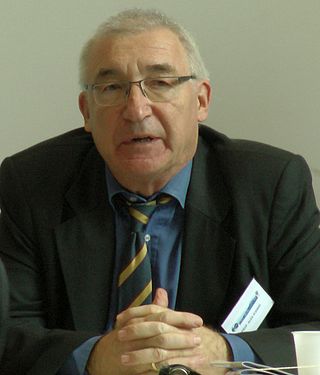Related Research Articles
State terrorism is terrorism that a state conducts against another state or against its own citizens.

Terrorism, in its broadest sense, is the use of violence against non-combatants to achieve political or ideological aims. The term is used in this regard primarily to refer to intentional violence during peacetime or in the context of war against non-combatants. There are various different definitions of terrorism, with no universal agreement about it. Different definitions of terrorism emphasize its randomness, its aim to instill fear, and its broader impact beyond its immediate victims.

Foreign policy, also known as external policy, is the set of strategies and actions a state employs in its interactions with other states, unions, and international entities. It encompasses a wide range of objectives, including defense and security, economic benefits, and humanitarian assistance. The formulation of foreign policy is influenced by various factors such as domestic considerations, the behavior of other states, and geopolitical strategies. Historically, the practice of foreign policy has evolved from managing short-term crises to addressing long-term international relations, with diplomatic corps playing a crucial role in its development.
There is no legal or scientific consensus on the definition of terrorism. Various legal systems and government agencies use different definitions of terrorism, and governments have been reluctant to formulate an agreed-upon legally-binding definition. Difficulties arise from the fact that the term has become politically and emotionally charged. A simple definition proposed to the United Nations Commission on Crime Prevention and Criminal Justice (CCPCJ) by terrorism studies scholar Alex P. Schmid in 1992, based on the already internationally accepted definition of war crimes, as "peacetime equivalents of war crimes", was not accepted.
Islamic terrorism refers to terrorist acts carried out by fundamentalist militant Islamists and Islamic extremists.
Christian terrorism, a form of religious terrorism, refers to terrorist acts which are committed by groups or individuals who profess Christian motivations or goals. Christian terrorists justify their violent tactics through their interpretation of the Bible and Christianity, in accordance with their own objectives and worldview.
A lone wolf attack, or lone actor attack, is a particular kind of mass murder, committed in a public setting by an individual who plans and commits the act on their own. In the United States, such attacks are usually committed with firearms. In other countries, knives are sometimes used to commit mass stabbings, or cars or truck are used in vehicle-ramming attacks. Although definitions vary, most databases require a minimum of four victims for the event to be considered a mass murder.

Religious violence covers phenomena in which religion is either the subject or the object of violent behavior. All the religions of the world contain narratives, symbols, and metaphors of violence and war. Religious violence is violence that is motivated by, or in reaction to, religious precepts, texts, or the doctrines of a target or an attacker. It includes violence against religious institutions, people, objects, or events. Religious violence includes both acts which are committed by religious groups and acts which are committed against religious groups.

Left-wing terrorism or far-left terrorism is terrorism motivated by left-wing or far-left ideologies, committed with the aim of overthrowing current capitalist systems and replacing them with communist or socialist societies. Left-wing terrorism can also occur within already socialist states as criminal action against the current ruling government.

Alex Peter Schmid is a scholar in terrorism studies, who from 1999 to 2005 was Officer-in-Charge of the Terrorism Prevention Branch of the United Nations Office on Drugs and Crime in Vienna. He is particularly known for his work on the definition of terrorism.

Sociology of terrorism is a field of sociology that seeks to understand terrorism as a social phenomenon. The field defines terrorism, studies why it occurs and evaluates its impacts on society. The sociology of terrorism draws from the fields of political science, history, economics and psychology. The sociology of terrorism differs from critical terrorism studies, emphasizing the social conditions that enable terrorism. It also studies how individuals as well as states respond to such events.

Jihadism is a neologism for modern armed militant Islamic movements that seek to establish states based on Islamic principles. In a narrower sense, it refers to the belief that armed confrontation is a theologically legitimate method of socio-political change towards an Islamic system of governance.
Terrorism in China refers to the use of terrorism to cause a political or ideological change in the People's Republic of China. While there is no international or legally binding definition of terrorism, internationally recognized organizations such as the UN and EU have defined terrorism in various resolutions. In the cultural setting of China, the term is relatively new and ambiguous.
Intimate partner violence (IPV) is domestic violence by a current or former spouse or partner in an intimate relationship against the other spouse or partner. IPV can take a number of forms, including physical, verbal, emotional, economic and sexual abuse. The World Health Organization (WHO) defines IPV as "any behavior within an intimate relationship that causes physical, psychological or sexual harm to those in the relationship, including acts of physical aggression, sexual coercion, psychological abuse and controlling behaviors." IPV is sometimes referred to simply as battery, or as spouse or partner abuse.
Communist terrorism is terrorism perpetrated by individuals or groups which adhere to communism and ideologies related to it, such as Marxism–Leninism, Maoism, and Trotskyism. Historically, communist terrorism has sometimes taken the form of state-sponsored terrorism, supported by communist nations such as the Soviet Union, China, North Korea and Democratic Kampuchea. In addition, non-state actors such as the Red Brigades, the Front Line and the Red Army Faction have also engaged in communist terrorism. These groups hope to inspire the masses to rise up and start a revolution to overthrow existing political and economic systems. This form of terrorism can sometimes be called red terrorism or left-wing terrorism.
Critical terrorism studies (CTS) applies a critical theory approach rooted in counter-hegemonic and politically progressive critical theory to the study of terrorism. With links to the Frankfurt School of critical theory and the Aberystwyth School of critical security studies, CTS seeks to understand terrorism as a social construction, or a label, that is applied to certain violent acts through a range of political, legal and academic processes. It also seeks to understand and critique dominant forms of counter-terrorism.
Maxwell "Max" Taylor is a criminal and legal psychologist. His early work specialised in the study of terrorism but he also became involved in the study of sex offenders, and in the development of capacity building activities for disadvantaged children in conflict zones, returning later to the study of terrorism.
Brenda J. Lutz holds a PhD in Politics from the University of Dundee in Scotland, and is currently an independent scholar, consultant, reviewer, and author in Massachusetts.
Terrorism in Sri Lanka has been a highly destructive phenomenon during the 20th and 21st centuries, especially so during the periods of the Sri Lankan Civil War (1983–2009) and the first (1971) and second JVP insurrections (1987–1989). A common definition of terrorism is the systematic or threatened use of violence to intimidate a population or government for political, religious, or ideological goals. Sri Lanka is a country that has experienced some of the worst known acts of modern terrorism, such as suicide bombings, massacres of civilians and assassination of political and social leaders. Terrorism has posed a significant threat to the society, economy and development of the country. The Prevention of Terrorism Act of 1978 is the legislation that provides the powers to law enforcement officers to deal with issues related to terrorism in Sri Lanka. It was first enacted as a temporary law in 1979 under the presidency of J. R. Jayewardene, and later made permanent in 1982.

Since the early 1970s, extrajudicial punishment attacks have been carried out by Ulster loyalist and Irish republican paramilitary groups in Northern Ireland. Attacks can range from a warning or expulsion from Northern Ireland, backed up by the threat of violence, to severe beatings that leave victims in hospital and shootings in the limbs. The cause of the attacks is disputed; proposed explanations include the breakdown of order as a result of the Northern Ireland conflict, ideological opposition to British law enforcement, and the ineffectiveness of police to prevent crime.
References
- ↑ "Professor Andrew Silke". Cranfield University . Retrieved 30 November 2019.
- ↑ "Andrew Silke". The Conversation. Retrieved 30 November 2019.
- ↑ Beatson, Jo (2003). "Terrorists, victims and society: psychological perspectives on terrorism and its consequences". Australian and New Zealand Journal of Psychiatry. 37 (6): 780. doi: 10.1080/j.1440-1614.2003.01285.x . ISSN 0004-8674.
- ↑ Forneris, Catherine A (2006). "Terrorists, Victims, and Society: Psychological Perspectives on Terrorism and Its Consequences". Journal of Cognitive Psychotherapy. 20 (1): 104–105.